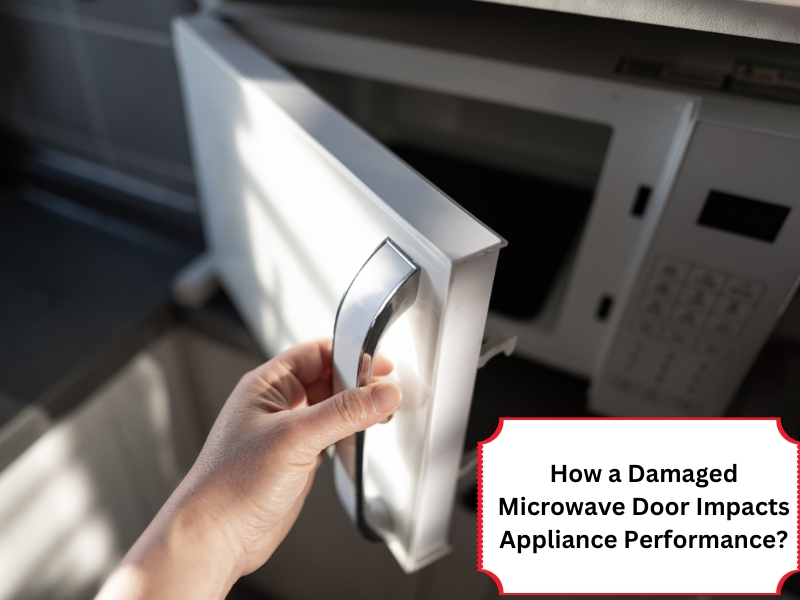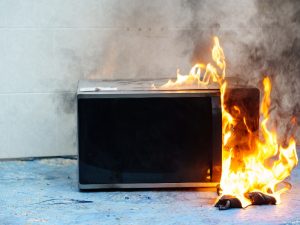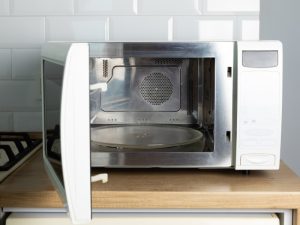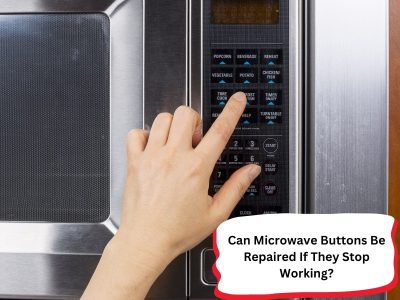
Blog
Microwaves are one of the most commonly used household appliances, providing quick and efficient meal heating. However, even the most reliable microwave can be less effective if the door becomes damaged. This seemingly minor issue can significantly impact the appliance’s overall performance, safety, and longevity. This article will explore how a damaged microwave door affects its operation and why addressing this problem promptly is essential.
What happens when your microwave door is damaged?
A microwave door is integral to the appliance’s operation. When damaged, it can affect multiple aspects of its performance, including safety, efficiency, and even energy consumption. Here’s what happens when your microwave door is compromised:
- Seal integrity is compromised: A damaged door may cause the microwave’s ability to seal properly to fail, leading to potential leaks of microwave radiation.
- Heating performance is affected: The door might no longer shut properly, which can result in uneven food heating.
- Safety risks arise: A cracked or broken door could pose serious safety hazards, especially if microwave radiation leaks out.
- Energy inefficiency: The appliance may work harder to heat food, consuming more electricity than necessary.
If you notice any damage to the door, it’s essential to act quickly before these issues escalate.
How can a broken microwave door affect heating efficiency?
When your microwave door is damaged, the efficiency of heating food can be severely affected. Here’s how:
- Uneven cooking: A damaged door can result in uneven microwave exposure, leading to hot spots and cold spots in your food. This means you might end up with parts of your meal overcooked and other parts undercooked.
- Longer cooking times: If the door is broken or misaligned, the microwave may run less effectively and need to work harder to heat food, resulting in longer cooking times.
- Energy wastage: A poorly sealed door can lead to microwave energy leakage, which makes the appliance use more power than needed. This could raise your electricity bills and make the microwave less efficient overall.
For a fully functional microwave, the door must be intact and able to close securely to ensure optimal heating.
Why is a damaged microwave door a safety hazard?
A damaged microwave door is not just a minor inconvenience; it can pose significant safety risks, including:
- Radiation leakage: A cracked microwave door compromises the sealed enclosure, increasing the risk of radiation leakage. While microwave radiation is non-ionising, damage allows harmful radiation to escape.
- Burn risks: If the microwave leaks heat or energy, it could cause burns when you open the door or handle hot food inside the appliance.
- Increased fire risk: Damaged microwave doors may create conditions for overheating or electrical faults, raising the risk of fire hazards.
Because microwaves are powered by high-frequency radiation, it’s essential to ensure that your appliance functions properly to avoid health risks.
Can a faulty microwave door lead to uneven cooking results?
Yes, a faulty door can significantly affect the quality of your cooking. A microwave with a damaged door can lead to:
- Uneven heating: When the door is broken, the microwave radiation is less likely to be evenly distributed, leading to some regions of your food being overcooked while others remain cold.
- Inconsistent defrosting: When defrosting food, uneven heating may cause some parts to be partially cooked while others remain frozen.
- Compromised taste and texture: With uneven heating, the texture and flavour of your meal may not be as intended, making your microwave less effective for everyday use.
Your microwave door must be intact if you want your meals to be cooked perfectly every time.
How does a faulty door impact appliance longevity?
A damaged microwave door can reduce the lifespan of your appliance in several ways:
- Overworking the appliance: When the door is damaged, the microwave has to compensate for the energy leaks and overwork the motor and components, which can shorten the appliance’s lifespan.
- Increased wear and tear: A broken door may cause the microwave to become misaligned, leading to further mechanical issues and putting unnecessary stress on the motor.
- The constant need for repairs: If the door isn’t fixed or replaced, it can cause ongoing performance issues, leading to higher repair costs and potentially a complete breakdown of the microwave.
To get the most out of your appliance and avoid the cost of frequent repairs, it’s essential to address any door damage as soon as possible.
Should you repair or replace a microwave with a damaged door?
When you notice your microwave door is damaged, you may wonder whether to repair or replace the entire unit. Here are some things to consider:
- Repair cost: If the door is the only issue, repairing it might be cost-effective. However, replacing your microwave may be better if it is old and prone to other problems.
- Warranty: If your microwave is still under warranty, you can repair or replace the door at little to no cost.
- Energy Efficiency: Newer microwaves tend to be more energy-efficient. If your old microwave consumes too much energy or takes too long to cook, investing in a replacement might save you money.
Ultimately, the decision depends on the severity of the damage and your microwave’s overall condition. If the door damage is extensive, replacing the unit may be the best option.
How can a faulty microwave door affect energy consumption?
A faulty microwave door can have a significant impact on your energy consumption. Here’s how:
- Inefficient energy use: When the door is damaged, the microwave may lose energy through gaps or cracks, causing it to work harder and use more electricity to heat food.
- Longer cooking cycles: If the microwave struggles to heat food evenly or adequately, it will run longer, leading to higher energy bills.
- Increased wear on components: The extra effort the microwave puts in due to a broken door can lead to components wearing out faster, increasing energy consumption over time.
In essence, a damaged microwave door makes cooking less efficient. In the long run, it can also cost you more on your electricity bills.
What are the benefits of buying a refurbished microwave?
If your microwave is beyond repair or you want a more cost-effective solution, buying a refurbished microwave can offer several benefits:
- Affordable pricing: Refurbished microwaves are significantly cheaper than buying new ones, providing excellent value for money.
- Quality assurance: Many refurbished microwaves are tested and certified to ensure they meet performance standards, offering peace of mind.
- Warranty included: Refurbished microwaves often come with warranties, protecting in case any issues arise after purchase.
- Eco-friendly choice: Purchasing a refurbished microwave helps reduce electronic waste, making it a more sustainable option for the environment.
Opting for top-quality refurbished and factory-second microwaves, you can enjoy the benefits of a high-quality appliance without breaking the bank.
Make sure your microwave is safe and efficient
A damaged microwave door can impact appliance performance in multiple ways, from inefficient cooking to increased energy consumption. Ensuring your microwave door is in good condition will improve the appliance’s performance and keep you and your home safe. If your microwave is beyond repair, consider purchasing a refurbished model for an affordable and eco-friendly option.
At Microwave Factory, we are committed to offering high-quality refurbished and factory-second microwaves at unbeatable prices. Our Sydney-based warehouse features appliances that have been expertly repaired and restored to ensure they perform like new. With our Best Price Guarantee and a 3-month warranty, you can shop confidently, knowing you’re getting exceptional value and peace of mind. Contact Microwave Factory today.
Frequently Asked Questions
- What are the signs of a damaged microwave door?
Look for cracks, gaps, misalignment, or difficulty closing the door securely.
- Can a damaged microwave door cause food to cook unevenly?
Yes, a faulty door can lead to uneven heating, with some parts of the food being overcooked and others undercooked.
- How does a damaged door affect energy consumption?
It can cause the microwave to work harder, increasing energy use and higher electricity bills.
- Is microwave radiation leakage dangerous?
Yes, leaking radiation can be harmful over time.
- Can a damaged door shorten the microwave’s lifespan?
Yes, it can overwork the appliance and increase wear and tear.
- What are the safety risks of using a microwave with a broken door?
Risks include radiation leakage, burns, and an increased fire hazard.
- What are the benefits of repairing a microwave door?
Repairing it can be cost-effective if the damage is minor and the microwave is relatively new.
- What are the factors to consider when deciding between repair and replacement?
Consider the repair cost, the microwave’s age and condition, and whether it’s still under warranty.
- Why might a refurbished microwave be a good option?
Refurbished microwaves are affordable, often come with warranties, and are an eco-friendly choice. - Where can I find quality refurbished microwaves?
Microwave Factory offers refurbished microwaves with warranties.





























